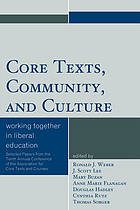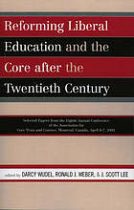Weber, R.J., Lee, J.S., Buzan, M., Flanagan, A.M., Hadley, D., Rutz, C. & Sorger, T. (2010). Core texts, community, and culture: Working together in liberal education. Lanham, MD: University Press of America.

This selection of papers from the tenth annual conference of the Association for Core Texts and Courses offers an eclectic mix of commentaries on core texts which participants have used in their own courses. The introduction addresses both the value of requiring a corpus of core texts (“works of major cultural significance”) in liberal education with particular emphasis on the creation of community.
